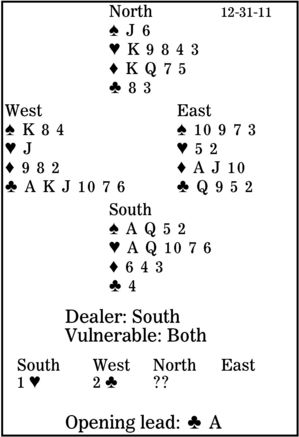Bridge column, December 31: Have a wonderful bridging New Year

This week we have been looking at deals in which the high-card points have been fairly evenly divided between the two partnerships. Here is one last example. How should the bidding go after South opens one heart and West overcalls two clubs?
Assuming South ends in four hearts, West leads the club ace. What should happen after that?
Since a slam is so unlikely, North should just shut his eyes and blast into four hearts. This rates to be a playable contract, but if it goes down, perhaps the opponents could have made four spades or five clubs. That will probably be passed out, it being tough for East to sacrifice in five clubs with such a balanced hand and potential defense. (Five clubs doubled goes down two, a good save if four hearts makes.)
After West leads the club ace against four hearts, if East encourages with the nine, West will try to cash the club king.
Then, declarer should ruff, draw trumps and lead a spade toward dummy's jack. He makes the contract if West has either the spade king or diamond ace. Here, if West ducks his king, South has no spade loser. And if West wins, declarer loses only one diamond, dummy's five and seven disappearing on the ace and queen of spades.
However, East should see the advantage in West's shifting to a diamond at trick two and signal with his club two. If West then switches to a diamond (or declarer leads a diamond to the king before playing a spade to the jack), the contract can be defeated.
** ** **
COPYRIGHT 2011, UNITED FEATURE SYNDICATE
DISTRIBUTED BY UNIVERSAL UCLICK FOR UFS

